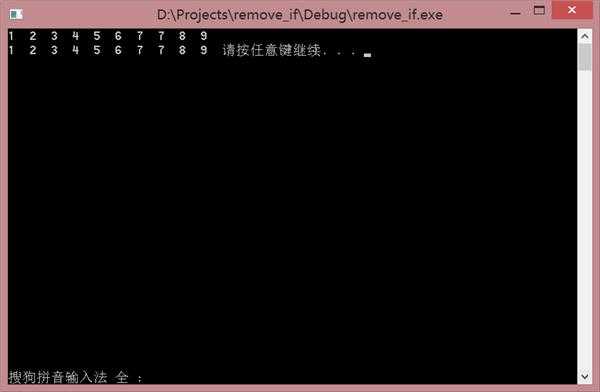上一段代码,本人本意是先移除大于5的元素但是结果貌似没变化,:
#include<iostream>
#include<algorithm>
#include<list>
#include<vector>
#include<list>
#include<functional>
bool func(int n)
{
return n > 5;
}
int main()
{
using namespace std;
list<int> li = { 1,2,3,4,5,6,7,7,8,9 };
for (auto x : li)
cout << x << " ";
cout<< endl;
remove_if(li.begin(),li.end(), func);
for (auto x : li)
cout << x << " ";
system("pause");
return 0;
}
得出结果:

该函数原型:
template<class _FwdIt,
class _Pr> inline
_FwdIt remove_if(_FwdIt _First, _FwdIt _Last _Pr _Pred)// Pred是谓词没错啊,为什么结果不是本人要的??
{ // remove each satisfying _Pred
_DEBUG_RANGE(_First, _Last);
return (_Rechecked(_First,
_Remove_if_unchecked(_Unchecked(_First), _Unchecked(_Last), _Pred)));
}
请大家帮看看,为什么?
解决方案
15
请注意它的返回值
remove 系列函数通常与容器的 erase 函数并用,称为 Erase–remove idiom
所以你的代码应该是
remove 系列函数通常与容器的 erase 函数并用,称为 Erase–remove idiom
所以你的代码应该是
li.erase(remove_if(li.begin(),li.end(), func), li.end());
5
用错了。具体问题在哪可以搜索一下 erase-remove idiom
既然已经用了 list ,可以直接用 list 的成员函数 remove_if ,效率更高(原因是不需要做移动操作)
既然已经用了 list ,可以直接用 list 的成员函数 remove_if ,效率更高(原因是不需要做移动操作)
li.remove_if(func);




![[小白求帮助]分配的内存什么时候需要手动释放](https://www.codebye.com/wp-content/themes/douth/timthumb.php?src=https://www.codebye.com/wp-content/themes/douth/assets/img/pic/5.jpg&h=110&w=185&q=90&zc=1&ct=1)